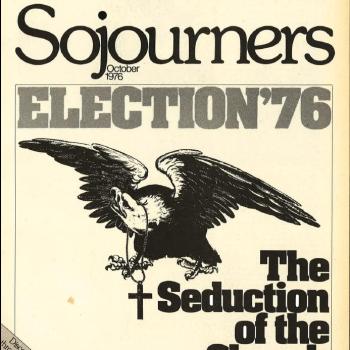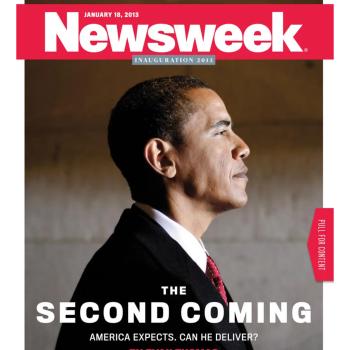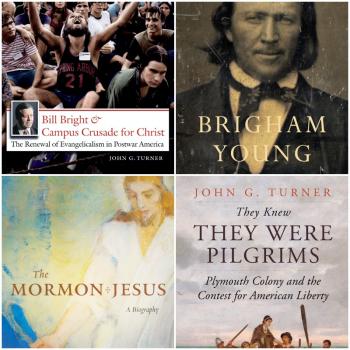It turns out that God rarely merits a mention in presidential debates. There’s often plenty of God-talk on the campaign trail and at party conventions, but not when the candidates talk with each other. As far as I could glean, the only mention of God in tonight’s debate was by Mitt Romney toward the end:
The role of government — look behind us: the Constitution and the Declaration of Independence… we are endowed by our Creator with our rights — I believe we must maintain our commitment to religious tolerance and freedom in this country. That statement also says that we are endowed by our Creator with the right to pursue happiness as we choose. I interpret that as, one, making sure that those people who are less fortunate and can’t care for themselves are cared by — by one another.
We’re a nation that believes we’re all children of the same God. And we care for those that have difficulties — those that are elderly and have problems and challenges, those that disabled, we care for them. And we look for discovery and innovation, all these thing desired out of the American heart to provide the pursuit of happiness for our citizens.
It was one of Romney’s better moments in a debate overwhelmed by dueling statistics and accusations, and it came off better on television than it does on the transcript (Romney’s remarks are not exactly coherent). Even if it was pre-planned, by referencing the words behind him Romney came off as unusually spontaneous. And Romney was finally able to pivot from endless feuding with Obama to the American ideals that many on both sides of the partisan divide cherish. The Declaration of Independence, especially the line quoted by Romney, is right at the heart of the American canon (see its prominent place in Stephen Prothero’s latest).
I also thought Romney did well to work in references to religious freedom (it’s noteworthy that he didn’t go there during the Obamacare debate – clearly he would rather not talk about social issues), the belief in all people as God’s children, and concern for the disadvantaged. Tax policy aside, he almost certainly believes in all of those things. Obama, by the way, does best when he talks about the need for Americans (and especially the wealthy) to look beyond self-interest to the needs of the entire American people.
Romney’s brief reference to a Creator made me wonder about the extent to which earlier presidential candidates referenced religion in debates. The first thing that came to mind was George W. Bush’s famous identification of Jesus as his favorite philosopher / thinker during a 1999 GOP primary debate in Iowa. Bush’s response “Christ, because he changed my heart … When you turn your heart and your life over to Christ, when you accept Christ as the savior, it changes your heart, it changes your life, and that’s what happened to me.” Widely panned by pundits at the time, I’ve long thought it was both authentic and good politics. The other candidates at the time looked like they wished they’d thought of Jesus first. In any event, one could probably find many other examples of recent Republican candidates talking about God and Jesus.
After tonight’s debate, I started exploring religious references in other presidential debates. I thought 1960, 1976, 1980, and 2000 were the most likely years in which religion might have surfaced as an issue. On the issue of religious toleration and tests for office, it’s been hard not to think back to 1960 this year. My friend Matt Bowman makes some good observations for TIME (hard to compare the nation’s biggest church to what is still a small minority), and I briefly engage some parallels and differences in this piece.
So was there much discussion of Catholicism or religion during the famous 1960 debates? In their third debate, Nixon and Kennedy both obliquely mentioned the issue of the Democratic candidate’s Catholicism:
Kennedy: Mr. Nixon knows very well that in this – in this whole matter that’s been involved with the so-called religious discussion in this campaign, I’ve never suggested, even by the vaguest implication, that he did anything but disapprove it.
Nixon: We can’t settle for anything but the best. And that means, of course, the best man that this nation can produce. And that means that we can’t have any test of religion. We can’t have any test of race. It must be a test of a man. Also as far as religion is concerned. I have seen Communism abroad. I see what it does. Communism is the enemy of all religions; and we who do believe in God must join together. We must not be divided on this issue. The worst thing that I can think can happen in this campaign would be for it to be decided on religious issues. I obviously repudiate the Klan; I repudiate anybody who uses the religious issue; I will not tolerate it, I have ordered all of my people to have nothing to do with it and I say – say to this great audience, whoever may be listening, remember, if you believe in America, if you want America to set the right example to the world, that we cannot have religious or racial prejudice. We cannot have it in our hearts. But we certainly cannot have it in a presidential campaign.
I cannot imagine how anyone could ever suspect Richard Nixon of being willing to use under-handed methods against his political opponents.
Nixon also, on at least two occasions (including during the fourth debate) put the Cold War in the context of religion:
In other words, the next president, as he leads America and the free world, can be only as great as the American people are great. And so I say in conclusion, keep America’s faith strong. See that the young people of America, particularly, have faith in the ideals of freedom and faith in God, which distinguishes us from the atheistic materialists who oppose us.
Moving ahead, the most Jimmy Carter said about his religion in the 1976 debates was that he would no longer discuss it with Playboy magazine:
The Playboy thing has been of very great concern to me. I don’t know how to deal with it exactly. I agreed to give the interview to Playboy. Other people have done it who are notable–Governor Jerry Brown, Walter Cronkite, Albert Schweitzer, Mr. Ford’s own Secretary of Treasury, Mr. Simon, William Buckley, many other people. But they weren’t running for President. And in retrospect, from hindsight, I would not have given that interview had I to do it over again. If I should ever decide in the future to discuss my deep Christian beliefs and condemnation and sinfulness, l would use another forum besides Playboy.
Ronald Reagan had little to say about his religious beliefs in 1980, but surprisingly, the most explicit discussion of religion that I’ve found in a presidential debate came in 1984. Fred Barnes, one of the moderators, asked both candidates to describe their religious faith and what role it played in their political decision-making. Barnes even pressed Reagan on why he did not attend church very often. Outside of the Obama-McCain forum with Rick Warren in 2008, this was very unusual. Here are the highlights:
Reagan: Well, I was raised to have a faith and a belief and have been a member of a church since I was a small boy. In our particular church, we did not use that term, “born again,” so I don’t know whether I would fit that — that particular term. But I have — thanks to my mother, God rest her soul — the firmest possible belief and faith in God. And I don’t believe — I believe, I should say, as Lincoln once said, that I could not — I would be the most stupid man in the world if I thought I could confront the duties of the office I hold if I could not turn to someone who was stronger and greater than all others. And I do resort to prayer.
At the same time, however, I have not believed that prayer should be introduced into an election or be a part of a political campaign — or religion a part of that campaign.
… about why I don’t go to church. I have gone to church regularly all my life, and I started to here in Washington. And now, in the position I hold and in the world in which we live, where Embassies do get blown up in Beirut — we’re supposed to talk about that on the debate the 21st, I understand — but I pose a threat to several hundred people if I go to church.
Mondale: I am a son of a Methodist minister. My wife is the daughter of a Presbyterian minister. And I don’t know if I’ve been born again, but I know I was born into a Christian family. And I believe I have sung at more weddings and more funerals than anybody ever to seek the Presidency. Whether that helps or not, I don’t know.
I have a deep religious faith. Our family does. It is fundamental. It’s probably the reason that I’m in politics. I think our faith tells us, instructs us, about the moral life that we should lead. And I think we’re all together on that.
What bothers me is this growing tendency to try to use one’s own personal interpretation of faith politically, to question others’ faith, and to try to use the instrumentalities of government to impose those views on others. All history tells us that that’s a mistake.
… This nation is the most religious nation on Earth — more people go to church and synagogues than any other nation on Earth — and it’s because we kept the politicians and the state out of the personal exercise of our faith. That’s why faith in the United States is pure and unpolluted by the intervention of politicians. And I think if we want to continue — as I do — to have a religious nation, let’s keep that line and never cross it.
Fascinating that Reagan didn’t claim the “born-again” label during this debate! He did so in 1976. I don’t know whether or not he spoke of himself as “born again” in 1980, but he certainly conveyed that sense quite strongly. In 1984, he affirmed his faith without mentioning Jesus. It’s also interesting that Mondale argues so forcefully for a strict separation between private religious belief and public policy / leadership.
I’m sure a more detailed analysis of religious language during presidential debates would reveal a great deal more. For now, I’m interested in the scarcity of religious language (with 1984 being an exception). Religious freedom comes up from time to time, God comes up on occasion, Playboy once, and Jesus only in Republican primary debates.
















